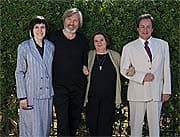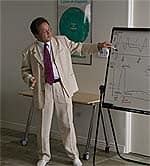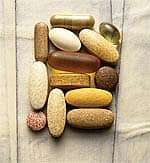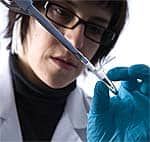Life Extension Magazine®
For decades, modern medicine has confronted and failed to solve the complexity of addiction. Using psychological methods and pharmaceuticals, the relapse rate for any type of addiction is astonishingly high. Neither patients nor physicians are optimistic about the chances of curing the abusive temptation of smoking, gambling, alcohol, or drugs. Now, an innovative approach has been developed by Dr. Jacob Marshak, a Russian physician who recently opened a small addiction clinic in California with an impressive success rate. This new, integrative approach combines nutritional supplements (Life Extension products are used exclusively), a low-glycemic index diet, special yoga exercises, meditation, individual and group counseling, 12-step methods, and the pioneering use of genetic testing to identify those more prone to addiction. The comprehensive program aims to change not only addictive thinking, but actual brain and body function, as well. The Marshak clinic hopes to replicate the doctor’s renowned success in Russia, where over the past 12 years he has achieved an astonishing 70% sobriety rate (after two years) in clients at his Moscow clinic. Marshak’s Background and ExperienceGrandson of Samuel Marshak, one of the most famous poets and translators in Russia, Jacob Marshak was a mathematician and an alcoholic when he realized his excessive drinking was causing serious problems in his professional life. Determined to overcome his need to drink, he found the beginning of the solution in his grandfather’s library, where a book on yoga (then forbidden in Russia) led him to the discovery that doing the exercises every day modulated his desire to consume alcohol.
“I found myself in a much better state of mind,” he explains, “and I noticed that my craving for alcohol was no longer present. So I decided to do these special types of hatha yoga exercises every day, twice a day. I never stopped doing them for six years and converted myself to a much more functional person.” Marshak also taught the yoga exercises to others and observed the same positive results with regard to addiction. Excited by this discovery, Marshak decided to change his profession and go to medical school, where he began doing research on addiction and studying the relationship between exercise and the craving for alcohol. He found that exercise resulted in a change of the body’s chemistry and thereby the subsequent lack of need for alcohol consumption. “A major component in our lives is the state of mood,” says Dr. Marshak. “All animals are the same. They serve their mood. They want to be uplifted, to feel happier, and to avoid suffering. I believe addiction is a disease of the prime regulation of our life, the regulation of the state of our mood.” When he began working with patients, Marshak, along with the support of his professor, became, he claims, the only yoga therapist in Russia. In the late 1980s, Marshak met addiction specialists from the United States who were so impressed with his findings that they invited him to come and study American addiction treatments, including the 12-step approach. During the year he spent in the US, Marshak became a certified addiction professional and developed his interest in supplements, which were not available in Russia at the time. Returning to Russia in the early 1990s, Marshak began working in a private clinic with a small number of heroin addicts, using imported supplements and yoga exercises. After three years, he had 30 sober people around him. In 1997, Marshak opened a private 40-bed clinic which over the past 11 years has treated about 1,500 addicts and alcoholics. The success rate was remarkable: about 70% of clients who went through the Marshak clinic in Moscow were living happy and sober lives two and more years after treatment. Word of Marshak’s continuing achievements spread and about a year ago, Marshak opened his first American clinic in Malibu, California. There, he is applying his methods to a small number of clients, with success similar to that in Russia. The Source of AddictionMarshak explains that our brains have a chemical reward system that controls various types of behavior, some of which are healthy instinctive behaviors, such as breathing, eating, sleeping, and reproduction, while others are learned behaviors that become imprinted on our brains as we repeat them. Abstention from any of these behaviors causes discomfort that, if it goes on long enough, can become intolerable. Then, if we seek relief by returning to the behavior, we experience comfort and gratification. The problem arises when the behavior is something that is not beneficial and leads to what Marshak calls the addictive disease.
He devised two rules for this condition: (1) the longer we suffer, the less time we have for tolerance of that suffering; and (2) we develop love for whatever takes us from dysphoria (discomfort and pain) to euphoria (comfort and well-being), and the behavior that causes this transition is imprinted in the unconscious memory that lasts for the rest of our lives. The Marshak method aims to keep individuals in a healthy state of comfort and well-being by using two main approaches: (1) psychological, to help addicts make a transition from unhappiness to happiness without the need for harmful behavior; and (2) biological, to restore healthy functioning in the brain’s reward system. Using Supplements with AddictsWhen Marshak was living and studying in the United States and discovering how nutritional supplements could help addicts recover, he was especially impressed by D,L-phenylalanine, which he notes has a very interesting action in the brain, helping to regulate the state of mood. Experimenting with heroin addicts, the first clients he worked with, Marshak found that this supplement, along with others he soon began using, was very effective. Immediately clients started to feel much better, he recalls, and they stopped their use of heroin. Marshak then started a Russian company to import supplements from the US and he began teaching his clients how to use them. Combined with diet and exercise, the supplements had a very beneficial effect. Over the years, Marshak and his daughter Sonia, a medical doctor, researcher, and scientific director of the Malibu clinic, have sought to discover which supplements are most helpful for recovering addicts. A chart of supplements currently used by the Marshak clinic, along with the reasons for their use appears on the next page.
“I am 62 and I do the exercises and take supplements. Most people don’t believe my age and say I look and act much younger,” he says. Marshak combines supplements with exercise to achieve what he calls “brain building.” In this way he says he can develop (1) a good quality of tranquility; (2) a good quality of stimulation or excitement; and (3) a strong network of inhibitory neurons to control the special centers in the brain that produce anxiety. Because Dr. Marshak’s clients do not all have the same brain patterns, genes, or psychological problems, an individualized regimen of supplements is devised for each one and may be modified as circumstances change. The program has a 28-day residency, followed by a suggested two-month sober living experience and then a monitored return to everyday life. The clinic provides clients with Life Extension supplements throughout the period of two years. Low-Glycemic Index DietFoods with a high glycemic index contain simple carbohydrates that quickly elevate blood sugar levels. In contrast, low-glycemic index foods produce only small changes in blood glucose and insulin levels. As well as causing many life-threatening diseases, Marshak adds that our preference for sugary foods often contributes to depression and can be one of the underlying causes in addictions. Marshak clinic CEO Joan Borsten explains that the diet used by the clinic is basically a diet for individuals with diabetes that benefits other people as well. It contains no sugar, no white flour, no potatoes, and no corn, but it’s very gourmet. She explains that alcohol and heroin addiction have a lot to do with sugar and the craving for sugar. The Marshak clinic’s low-glycemic index diet changes the way the body functions, providing a very efficient way to become healthy and restore normal brain chemistry.
Genetic TestingFor many years, scientists have been aware that addiction runs in families and have verified this using standard twin and adoption studies. Trained in neuroscience, Sonia Marshak has identified four genes that have been linked to addiction; she is working on identifying more. “The genes that have been identified are responsible for the synthesis of chemicals in the brain that make you feel good,” says Sonia. Addiction has been shown to be about 60-70% related to genetic factors and only 30-40% related to environmental factors, she explains. Of course, some people who are alcoholics or drugs addicts do not have any family members who suffer from addiction, but those cases are rare. But just inheriting genes that make you prone to addiction is not enough. Environmental factors, such as stress, trauma in early childhood, or a history of child abuse are often linked with drug addiction. The presence of addiction-linked genes makes people more prone to developing this type of pattern; however, it does not mean that people who have inherited these genes will necessarily develop an addiction during their lifetime. Sonia notes that because of its biochemical nature, you cannot cure this disease of addiction. It’s imprinted on the brain and thus impossible to erase. But a determined individual who faithfully follows a program like the one devised by the Marshak clinic can learn to remain sober for a lifetime.
The Role of ExerciseSonia explains that the Marshak method employs three basic types of exercise. The categories comprise exercise that is calming, invigorating, and anxiety-controlling. Depending on an individual’s needs at any given time, different exercises can be selected to stimulate, to calm, or to counter anxiety. Facts About the Marshak ClinicAt this time, the cost of the addiction program totals $50,000 for a 90-day program that includes clinic residency, food, follow-up in sober living houses, supplies of supplements, weekly alumni meetings, and regular services of an individual sober coach, who may accompany clients to meetings, join them for food shopping, or do exercise with them, all in an effort to make sure clients adhere to the principles of the program. As Borsten explains, “The coach works with you to try to resolve some of the problematic issues you may have in your life as a result of your past addiction, so those issues don’t become a trigger for you to drink or use drugs again.” In order to reach a wider audience and help more people with addiction problems, Dr. Marshak is currently hoping to open more affordable clinics and is also writing a series of books explaining his findings and methods.
One Client’s ExperienceLife Extension magazine spoke with a client of the Marshak clinic. She asked us to call her Mia in order to protect her privacy, but she is very forthcoming about everything else. As one of the first clients to enter the Malibu Marshak clinic when it opened in 2007, Mia has nothing but praise for Dr. Marshak and his approach to helping people overcome addiction. “I wanted a program that was holistic,” Mia explains. “I have been taking supplements my whole life, I’ve always been into nutrition, and actually I’ve been very healthy, other than my addiction to alcohol.” Mia is one of the few Marshak clients who were not found to have genes linked to addiction, although she explains she will be tested for one or two more that have since been identified. Mia ascribes her alcohol problem to the learned habit of binge drinking she acquired in high school, which she carried on through college and never gave up. Prior to finding the Marshak clinic, Mia tried other approaches, but soon realized she needed something more than a 12-step program or antidepressants, neither of which worked for her. “To be honest,” she admits, “I knew my problem was what I had done to myself through all those years of drinking. I knew I had changed my brain.”
After learning about the Marshak program, Mia entered the clinic and found that it worked. “After three days, I felt extremely better, extremely happier, my mood was elevated. I felt like the clouds hanging over my head, that fog, was lifted and I finally felt normal.” Mia says that the other approaches she tried dealt only with isolated psychological or chemical aspects and did not provide the multidisciplinary treatment that has finally proven successful for her. “They really concentrate on what’s going on in your brain,” she says. “Dr. Marshak spent years studying and researching this and I’m now a firm believer that your biochemistry affects your state of mind, your mood, and your behavior.” Determined to make the program work, Mia says she followed everything strictly. The result? Sobriety that has lasted and a strong commitment to all the follow-up care the clinic provides, including daily supplements, exercise, and low-glycemic index foods; attending 12-step meetings and Marshak clinic weekly meetings; and working with a sober coach. “They have everything,” Mia says, “and it’s the aftercare that is keeping me sober more than anything else. It’s amazing.” “Dr. Marshak has a regimen of supplements that are specifically prescribed for each person, depending on what their genetic makeup is,” Mia explains. “He’s going to make sure you get what you need. And he uses Life Extension supplements because he says the purity and quality is there, that they really work.” She has tremendous respect for Dr. Marshak, explaining that he completely understands the addiction process and has worked out a way to help addicts by using a combination of different methods to change the way the brain works. “When I left the clinic, I felt great, I felt like my depression had lifted and all my cravings were gone. There is simply no other program like this,” she concludes. “It really does work.” -Marshak clinic client The Marshak clinic can be contacted at 1-800-366-8101 or info@marshakclinic.com. If you have any questions on the scientific content of this article, please call a Life Extension Health Advisor at 1-800-226-2370. | |||||||||||||
| References | |||||||||||||
| 1. Interview with Dr. Jacob Marshak. May 16, 2008 2. Interview with Dr. Sonia Marshak. April 25, 2008. 3. Interview with Joan Borsten. April 17, 2008. 4. Interview with Mia. May 25, 2008. 5. Unedited manuscript by Dr. Jacob Marshak, explaining the details of his addiction research and clinic program. Property of Counselor magazine. 6. List of supplements used by the Marshak clinic, including reasons for use. 7. List of supplements used by Dr. Marshak personally. 8. Information and video from the Marshak clinic website: www.marshakclinic.com. 9. Eckholm E, Pierce O. Methadone rises as a painkiller with big risks. The New York Times. August 17, 2008. 10. Schwirtz M. Russia scorns methadone for heroin addiction. The New York Times. July 22, 2008. 11. Brody JE. Trying to break nicotine’s grip. The New York Times. May 20, 2008. 12. Fathi N. Iran fights scourge of addiction in plain view, stressing treatment. The New York Times. June 27, 2008. 13. ABC Television. Staying sober with Daniel Baldwin. Feature on addiction treatment, including Eamon O’Hara, who is helped by actor Daniel Baldwin and checks into the Marshak clinic in Malibu. March 28, 2008. 14. Available at: http://www.forbes.com/2004/03/17/cx_cv_0317feat.html. Accessed November 14, 2008. 15. Available at: http://www.foxnews.com/story/0,2933,60545,00.html. Accessed November 14, 2008. 16. Available at: http://www.bettyfordcenter.org/programs/. Accessed November 14, 2008. 17. Available at: www.marshakclinic.com/Programs.html. Accessed November 14, 2008. |







